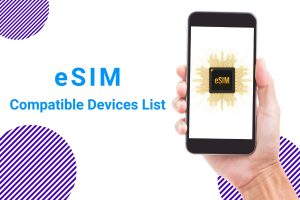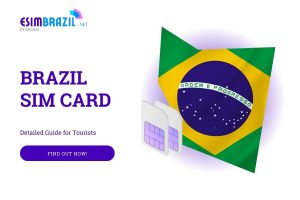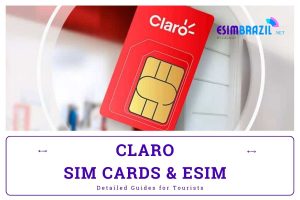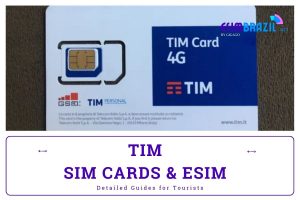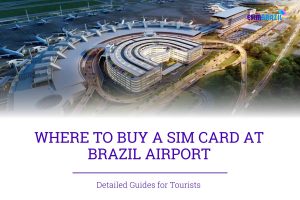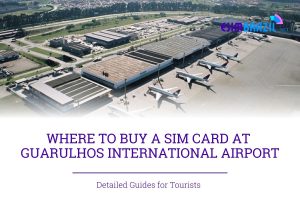Staying connected to the internet while traveling Brazil is crucial for many modern-day travelers. Whether you need to stay in touch with loved ones, access online maps and translation tools, or simply share your adventures on social media, having reliable internet access can greatly enhance your travel experience. In this comprehensive guide, we’ll explore the various options for mobile internet in Brazil, helping you make an informed decision on the best connectivity solution for your needs.
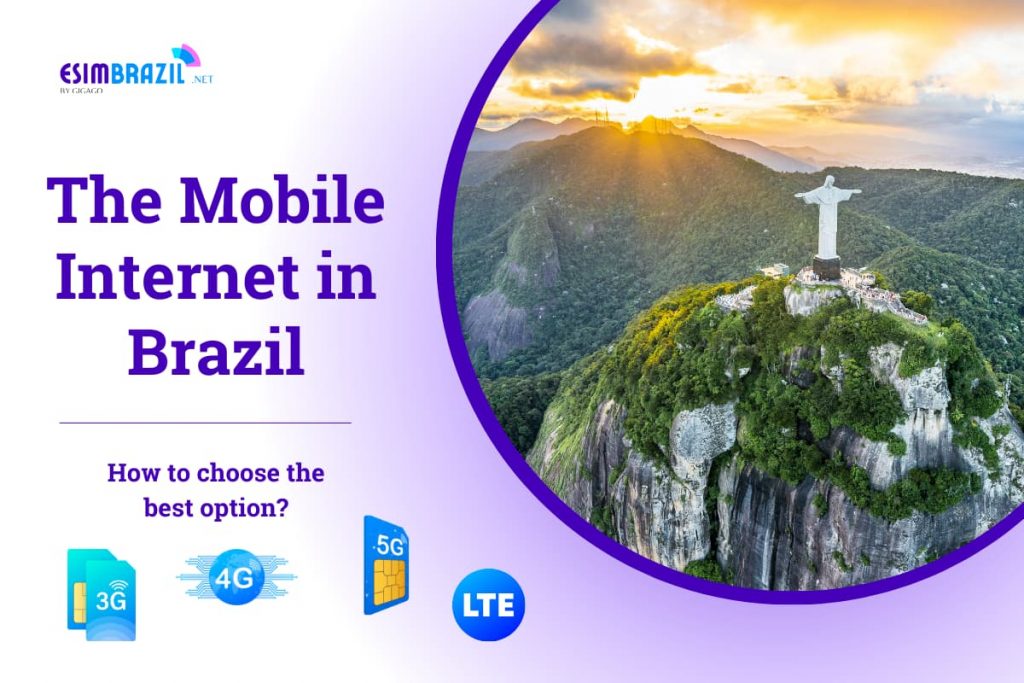
Table of Contents
I. Mobile Internet Coverage and Speed in Brazil
1. Brazil Mobile Internet Coverage
Brazil enjoys widespread 4G coverage nationally thanks to continuous investment from the leading carriers – Claro, Vivo and TIM. All three networks have reliable connectivity in major population centers.
In cities, customers can expect fast LTE speeds both outdoors and indoors. Coverage is densest in state capitals and municipalities with over 50,000 residents. Sao Paulo, Rio de Janeiro, Brasília and other large economic hubs have near-seamless connectivity.
- Vivo: Vivo boasts robust 4G coverage across Brazil, reaching over 90% of the population in more than 5,500 municipalities nationwide. Major business hubs like São Paulo and Rio de Janeiro experience near-seamless indoor and outdoor connectivity. While coverage decreases slightly in small towns and rural areas, Vivo has invested heavily in infrastructure to ensure customers retain data access even in remote locations
- Claro: With one of the largest network footprints in Brazil, Claro provides speedy 4G to all state capitals and municipalities with over 30,000 residents. Their coverage spans over 5,000 cities and towns across diverse terrains in 26 states and the Federal District. Claro has traditionally focused on densely populated southeastern states but continues extending infrastructure to less populated areas. Reliability remains strong in major economic hubs, though occasional drops to 3G can occur in very isolated locales
- TIM: TIM delivers powerful 4G access to Brazil’s key commercial hubs, currently numbering over 4,500 cities passed by their extensive network infrastructure. Coverage is densest and fastest in capitals and cities inhabited by 50,000 people or more. While network density lags relatively in the Northeast and Amazon regions compared to TIM’s Southeastern strongholds, ongoing buildouts are improving remote accessibility
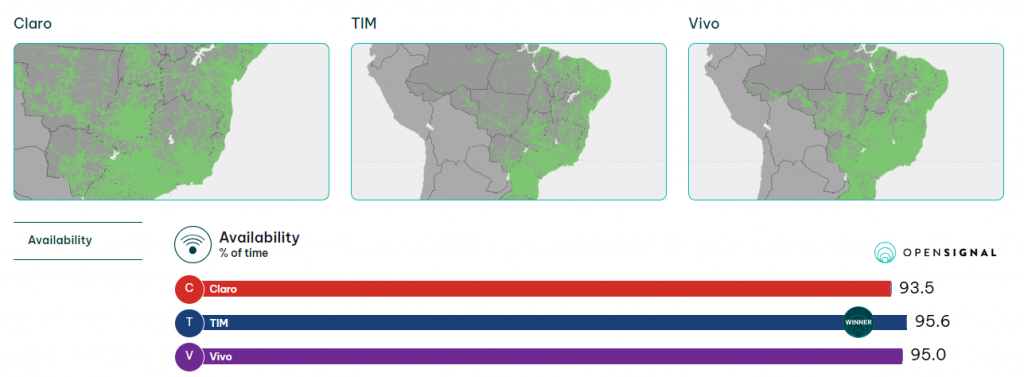
2. Brazil Mobile Internet Speed
According to recent reports, the average mobile internet speed in Brazil is around 53 Mbps for download, ranks 51st in the world for mobile internet speeds. However, it’s important to note that these are average speeds, and actual speeds can vary depending on factors such as location, network congestion, and the specific mobile operator you choose.
In major cities like São Paulo and Rio de Janeiro, where mobile networks are more robust, you can expect faster speeds, often exceeding 50 Mbps for downloads. In contrast, rural areas and smaller towns may experience slower speeds due to limited network infrastructure.
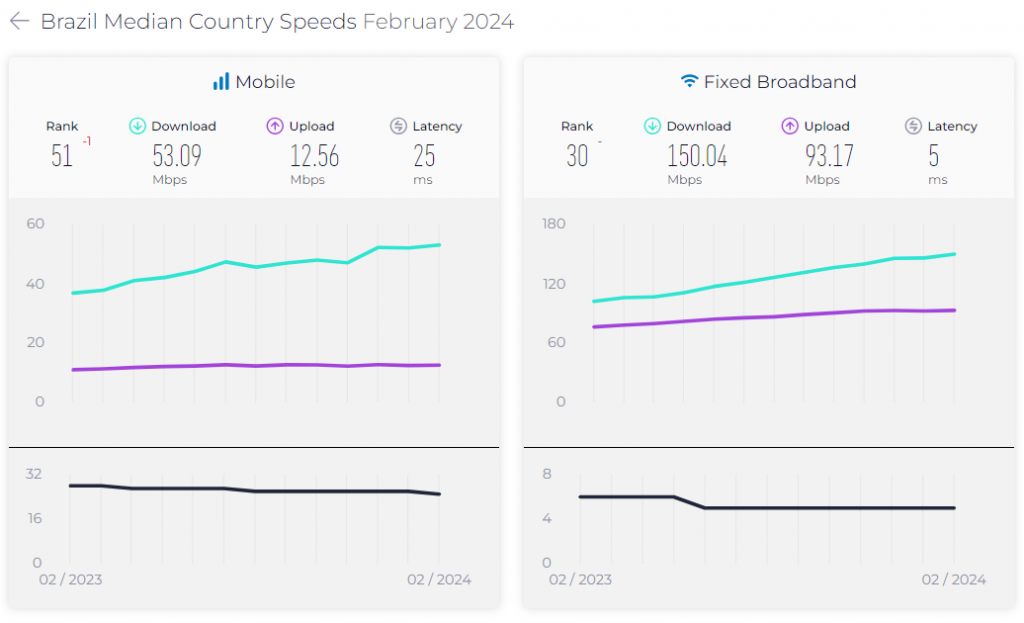
National Ranking:
- Uruguay: Uruguay comes in higher at 37th globally, benefitting from its more compact size to achieve average mobile downloads of 66.43 Mbps.
- Argentina: Argentina lagsbehind in 100th place with average speeds of just 29.45 Mbps.
With noticeable upticks in 5G expected in the next few years, mobile internet in Brazil will only get faster, making it very easy to stay in touch and explore more via a smartphone wherever your journey may take you
Note: Internet speeds are AVERAGE speeds. NOT the fastest internet speeds available in Brazil.
II. Mobile Internet in Brazil: Connection Options for Tourists
As a tourist in Brazil, you have several options to stay connected to the internet during your travels. Each option has its own advantages and disadvantages, so it’s essential to evaluate your specific needs and preferences before making a decision.
| Option | Pros | Cons | Price Range (USD) |
| Free Public Wi-Fi | – Cost-effective – Widely available in urban areas | – Limited availability in remote areas – Unreliable and slow connectivity – Security concerns | Free |
| Pocket Wi-Fi | – Portable and convenient – Secure private connection – Multiple device connections | – Additional device required – Battery life limitations – Rental or purchase costs | $5 – $15 per day (rental) $50 – $200 (purchase) |
| eSIM | – Convenient digital activation – Instant connectivity – Multiple profiles support | – Limited device compatibility – Fewer provider options | $10 – $50 (data plan) |
| Local SIM Card | – Affordable data plans- Extensive coverage – Flexible options | – Setup process required – Potential compatibility issues | $5 – $30 (SIM card) $10 – $50 (data plan) |
| Roaming | – Convenience of using your home number – No setup required | – Expensive roaming charges – Limited data allowance – Potential coverage gaps | Varies by home carrier and plan |
For travelers visiting Brazil, purchasing a local SIM card or eSIM provides the most convenient and cost-effective connectivity options. It allows visitors to access mobile data, maps, translation apps and communication services without facing expensive roaming charges or unreliable public WiFi. While setup may require a small learning curve, local SIM cards and eSIMs provide travelers with a reliable and affordable way to remain connected during their time in Brazil.
Recommendation: For easy connectivity throughout their Brazil trip, travelers can’t go wrong choosing an eSIM from esimbrazil.net for high-speed mobile data on the go. They offer simple and affordable data packages for all trip durations. Plans start at just $27.90 for 1GB over 3 days and go up to 5GB for $88 valid over 30 days.
Go Beyond Borders with esimbrazil.net
III. Mobile Internet Rates in Brazil
Mobile internet rates in Brazil can vary significantly depending on the mobile operator, data plan, and package you choose. To give you an idea of the typical costs, here are some examples of mobile internet rates from major Brazilian carriers:
| Connectivity Option | Cost per MB in USD | Notes |
| SIM Card (Pre-Paid) | $0.02-0.06 | Rates vary by carrier and data package. Charged per MB used. |
| SIM Card (Post-Paid) | $2-6/GB | Rates vary by carrier and data package. Plans are typically 1-5GB bundles charged monthly. |
| eSIM | $10-50 | eSIM plans have same pricing structures as physical SIM cards from carriers. |
| Free WiFi (Public Hotspots) | Free | Many public places like airports, malls, cafes offer free WiFi but speeds may be slow. |
| Roaming in South America | $0.10-0.20/MB | Rates are more expensive than domestic rates when roaming in other South American countries. |
| Roaming in Europe/USA | $0.40-1.00/MB | Significantly higher roaming rates apply when traveling outside of South America. |
It’s important to note that these rates are subject to change and may vary based on promotional offers or package deals. Additionally, some carriers offer discounted rates for longer-term commitments or bundle deals that include voice and SMS services along with data.
When choosing a mobile internet plan in Brazil, consider factors such as your expected data usage, duration of stay, and the areas you’ll be visiting. It’s generally recommended to opt for a larger data allowance if you plan to stream videos, use navigation apps, or engage in other data-intensive activities.
IV. Best Mobile Operators in Brazil
Brazil has several major mobile operators that provide nationwide coverage and competitive mobile internet services. Here’s an overview of some of the best mobile operators in Brazil:
| Operator | Coverage | SIM Card Price Range | Pros | Cons |
| TIM | Extensive nationwide 4G coverage. Good coverage in major cities. | R$10-30 | Large network, fast speeds in many areas. Wide variety of plans. | Can be more expensive than alternatives. Customer service not as strong. |
| Vivo | Very wide 4G coverage across Brazil. Strong coverage in both urban and rural areas. | R$15-40 | Reliable network. Good coverage even in remote places. Strong customer support. | Plans tend to be on the more expensive side. |
| Claro | Large network with nationwide 4G coverage. Strong in metropolitan regions. | R$10-25 | Affordable plans. Wide selection of prepaid and postpaid options. Good speeds in cities. | Coverage can be spotty in remote rural regions. |
When it comes to finding an operator that can keep you connected whether in the biggest city or the smallest village, Vivo’s reliable and extensive coverage network makes it the best overall provider in Brazil.
When choosing a mobile operator in Brazil, consider factors such as coverage in the areas you’ll be visiting, data plan options, and customer reviews. It’s also worth noting that some carriers may offer better roaming agreements or international package deals if you plan to use their services in other countries during your trip.
V. FAQs
Can I use my home SIM card in Brazil?
Yes, you can use your home SIM card in Brazil, but you’ll be subject to international roaming charges from your home carrier. These charges can be expensive, so it’s often more cost-effective to purchase a local Brazilian SIM card or an eSIM plan.
Do I need to unlock my phone to use a local SIM card in Brazil?
In most cases, yes. Your phone needs to be unlocked (not tied to a specific carrier) to be able to use a local Brazilian SIM card. Check with your home carrier or device manufacturer for instructions on how to unlock your phone.
Can I use my eSIM plan from another country in Brazil?
Yes, many eSIM plans are designed for international use, allowing you to maintain connectivity in multiple countries, including Brazil. However, it’s important to check the specific coverage and data plans offered by your eSIM provider for Brazil.
How do I purchase a local SIM card in Brazil?
You can purchase a local Brazilian SIM card from mobile operator stores, kiosks, or authorized resellers in major cities and airports. Be prepared to provide a valid ID and, in some cases, proof of your temporary address in Brazil.
Can I use my mobile internet plan for tethering or creating a Wi-Fi hotspot?
Most mobile operators in Brazil allow tethering or creating a personal Wi-Fi hotspot with their data plans, but some may charge an additional fee or have limitations on the number of devices that can be connected. Check the specific terms and conditions of your chosen plan.
VI. Conclusion
Remember, the key to a successful mobile internet experience in Brazil lies in researching and understanding the different options available. By considering factors such as coverage, speed, data allowances, and pricing, you can choose the connectivity solution that best suits your travel requirements and budget. Safe travels and stay connected!
